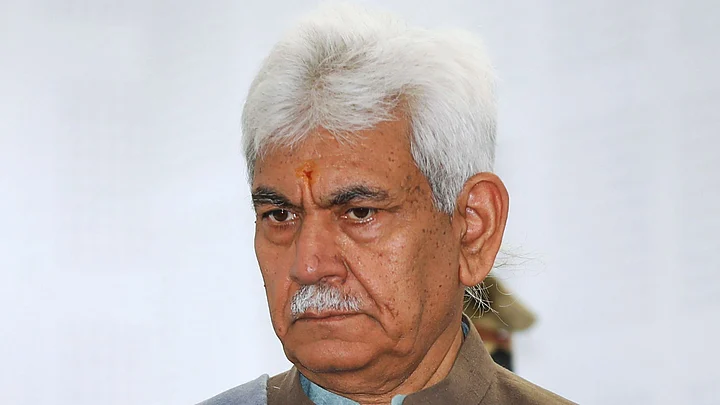The impending nomination of five MLAs by the Lieutenant Governor, as permitted under the Jammu and Kashmir Reorganisation (Amendment) Act, 2023, has raised significant questions about its implications for government formation after the results of the J&K assembly elections are revealed on 8 October.
The move is intended to enhance representation for marginalised communities like the Kashmiri Pandits and the displaced population of Pakistan-occupied Jammu and Kashmir (PoJK). While proponents argue that this inclusion addresses long-standing demands for political representation, critics assert that the timing and manner of these appointments may skew the electoral balance and undermine representative democracy.
The clause further delineates criteria for eligibility, specifying that these nominations should reflect the historical displacement of these groups due to civil unrest and disturbances after 1947 and 1990.
Consequently, the total strength of the assembly will increase to 95 members, raising the majority threshold to 48 seats for government formation.
Implications
The clause in question states that the nominated members will be given full legislative powers. Political parties and legal experts, however, argue that such nominations should be subject to the approval of a democratically elected government, ie, they should not be unilaterally decided by the LG and the Centre.
Political analyst Amjad Shah asserts, “This could have been done in an impartial manner by letting the future cabinet decide the nominations. After conducting fair elections in J&K amidst stringent challenges, the government must ensure that the people’s trust does not get eroded. This clause, though beneficial to marginalised communities, will always favour the party at the Centre, giving it an undue advantage in the newly formed assembly.”
The provision for nominated members is comparable to the structure in other union territories like Puducherry, where the LG holds the power to nominate members. However, in the context of J&K—a region with a unique political history and a special status until the abrogation of Article 370—such powers can have far-reaching implications for federalism and democracy.
In Puducherry, in the face of judicial scrutiny, the Supreme Court ruled that the LG’s nomination of three members to the assembly without consulting the chief minister was constitutionally permissible. However, it also emphasised that the LG must act in harmony with the elected government wherever possible.
Reactions
The introduction of this provision has not gone unchallenged. Several political leaders have voiced strong objections.
Varinder Singh Sonu, a senior leader of the People’s Democratic Party (PDP) and candidate from the Bahu Constituency in Jammu, stated, “I urge all political parties to come forward and demand that, in order to uphold democratic principles, no such appointment should be made without the approval of the future cabinet.”
The Congress party has echoed similar sentiments. In an official statement, the Jammu and Kashmir Pradesh Congress Committee (JKPCC) termed any move to nominate MLAs before government formation as “undemocratic and against the mandate of the people.”
Ravinder Sharma, the senior vice president and chief spokesperson of JKPCC, added, “The power to nominate five members to the legislative assembly should lie with the new government. Any such exercise prior to government formation would be contrary to democratic norms and yet another betrayal of the people’s mandate.”
The National Conference (NC), too, has raised strong objections. Rattan Lal Gupta, the provincial president of NC, remarked, “In a democratic setup, the elected government must have the authority to make these nominations. The LG, though part of the administration, does not have the constitutional right to make such decisions in the presence of an elected government.”
Accusing the Bharatiya Janata Party (BJP) of resorting to unethical practices, Gupta added, “Having lost the assembly polls, the BJP has now turned to desperate measures, including indulging in horse-trading by approaching independent candidates. This reflects their unwillingness to respect the democratic will of the people and their attempts to manipulate the political landscape.”
Complexities
Other communities are now calling for representation as well.
Balwinder Singh, vice president of the District Gurdwara Parbandhak Committee (DGPC) Jammu, has called for broader inclusivity. “While we agree that no nomination should be made on a religious basis, the Sikh community, which constitutes only 2.1 percent of the total population, has been struggling for political representation. We were severely affected and displaced during the 1947 Partition, just like the Kashmiri Pandits. Why can’t the government consider this as a criterion for our nomination then?”
The justification for the nomination of members from the Kashmiri Pandit community and the displaced population from POJK is rooted in the historical context of the region. These communities have been marginalised for decades, with limited political representation. Both communities have endured profound suffering, from the brutal Kabili Onslaught and the tumultuous events of 1947 to the devastating insurgency of the 1990s.
Today, the Kashmiri Pandits mostly reside in Jagti Camp, while refugees from POJK live in camps in Simbal and Gol Gujral, now regularised into colonies. Many of these POJK refugees belong to the micro-minority Sikh community, yet their voices remain unheard in the assembly, highlighting the enduring struggles for representation and recognition.
Thus, the Delimitation Commission’s recommendation to include members from these groups seeks to address this historical neglect. However, the move to grant them full voting rights in the assembly—without electoral accountability—raises fundamental questions about the legitimacy of their participation in legislative decision-making.
(Kanwal Singh is a policy analyst from J&K. Views are personal)
(At The Quint, we question everything. Play an active role in shaping our journalism by becoming a member today.)
